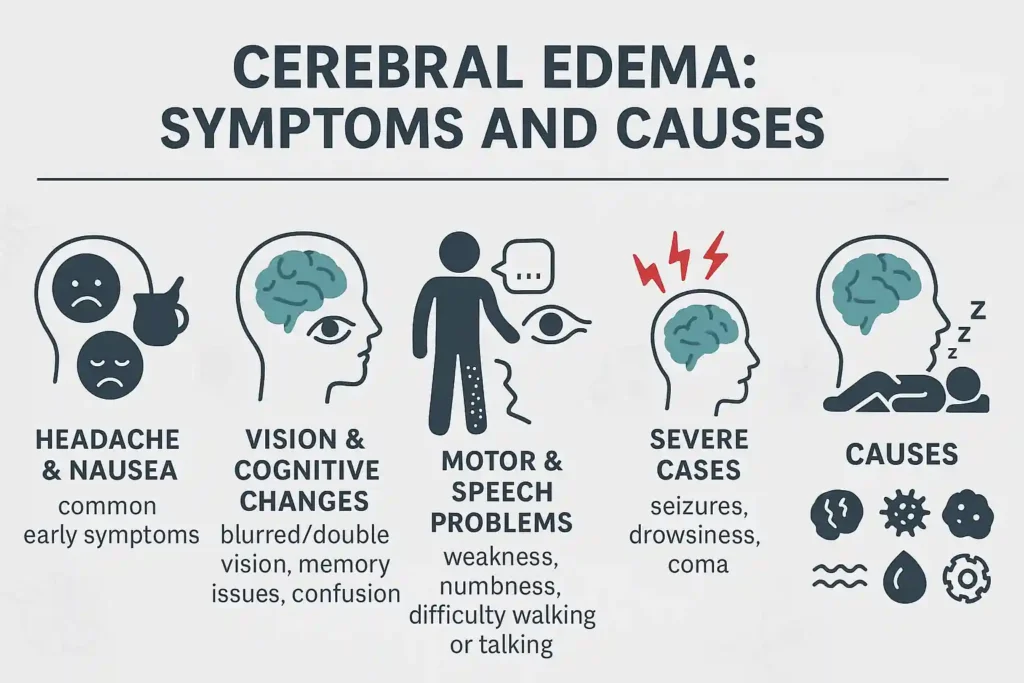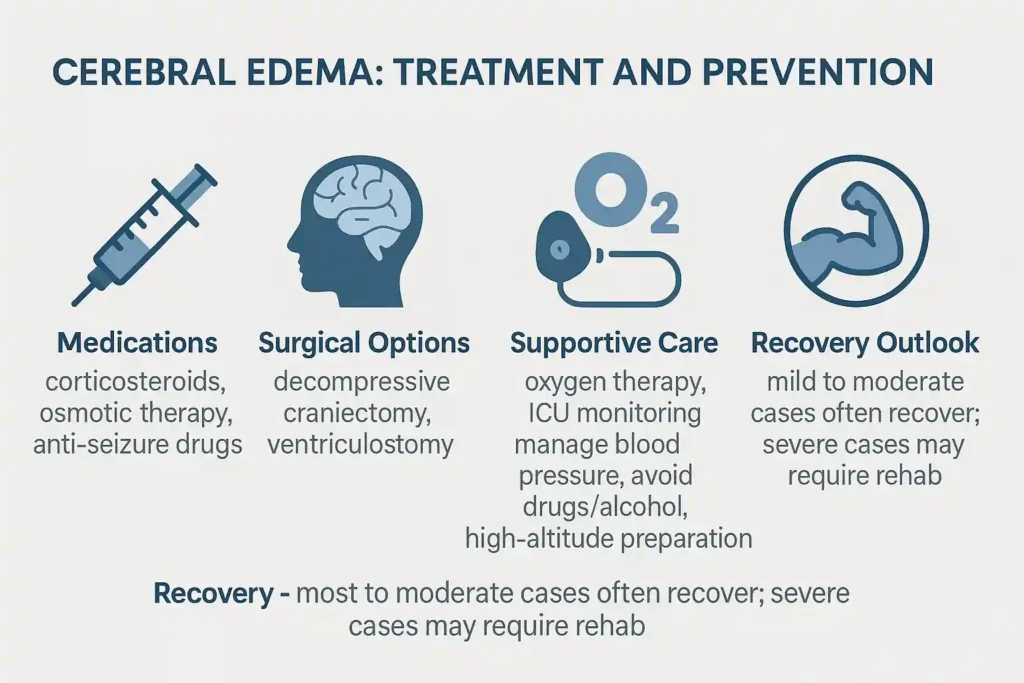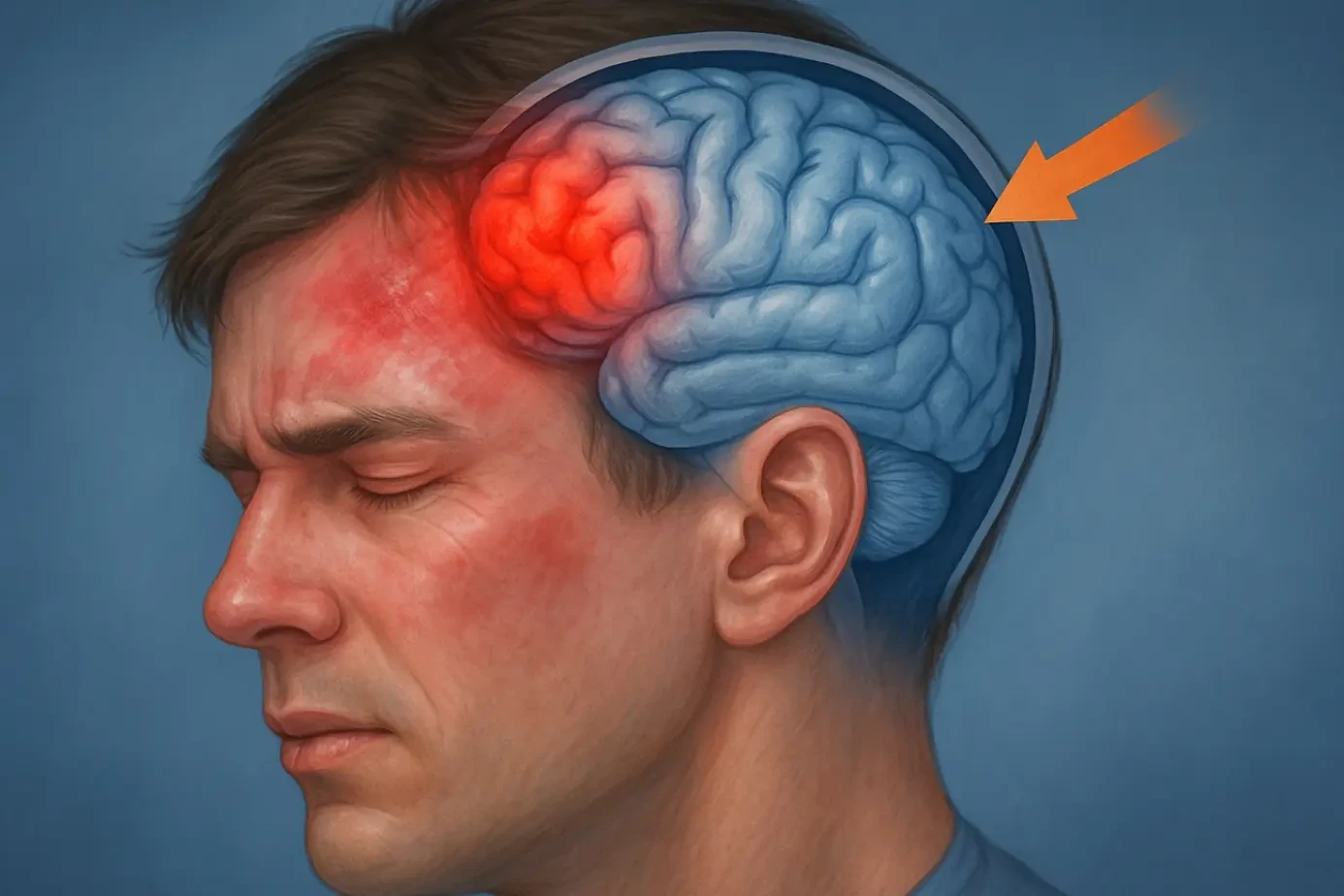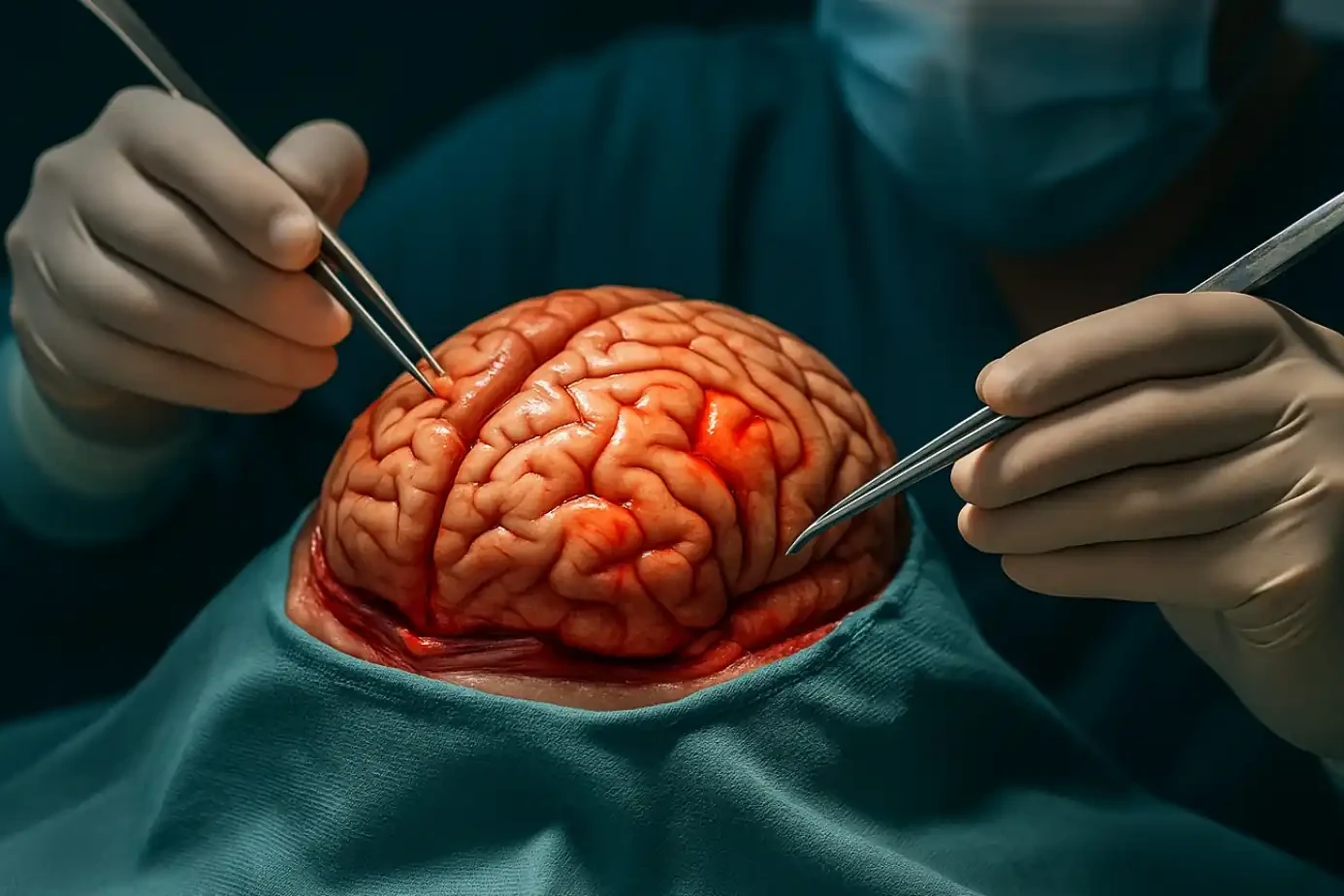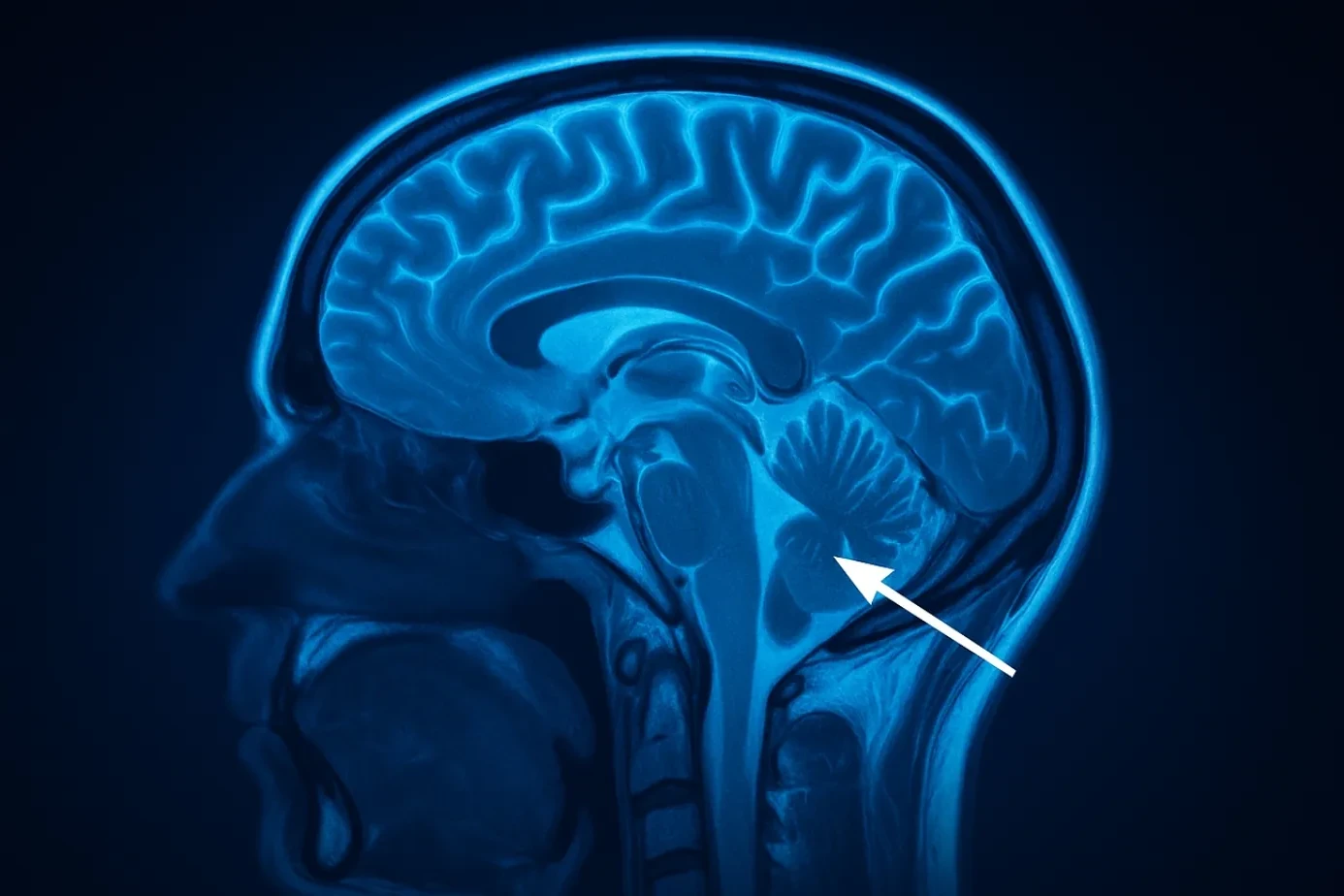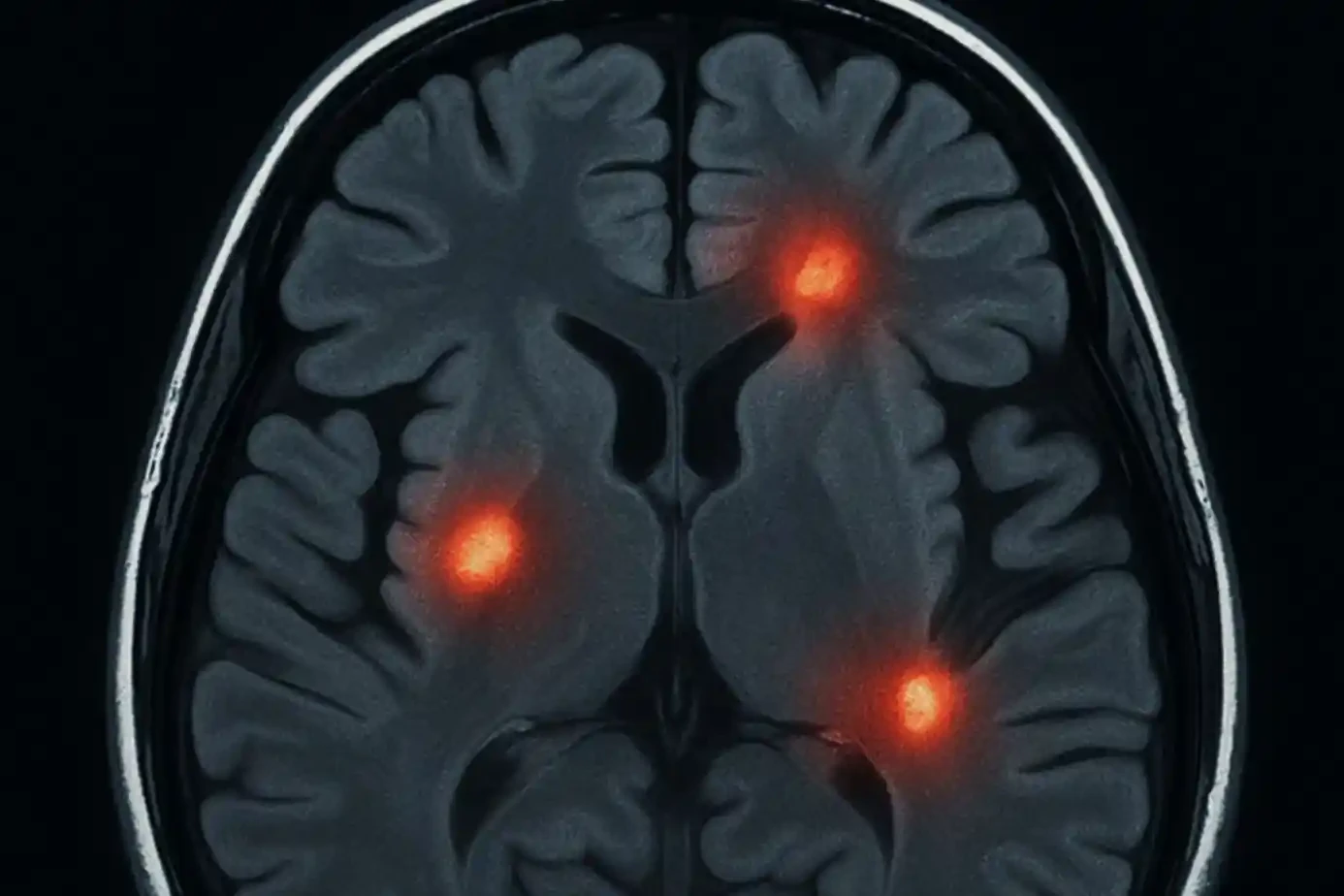What is cerebral edema?
Cerebral edema refers to an unusual accumulation of fluid within the brain. This swelling causes the brain to become larger than its typical size. Since the brain is locked inside a hard skull, the extra pressure pushes against delicate tissues. This can reduce blood supply, damage nerve cells, and sometimes stop normal brain function.
Many people ask, what is cerebral edema? In simple words, it’s “brain swelling that becomes dangerous if not treated fast.” It’s not just swelling, it’s pressure inside the head that can quickly turn into a life-threatening emergency.
Types of cerebral edema
Doctors classify brain swelling into several types:
- Vasogenic edema: caused by leakage from damaged blood vessels when the blood-brain barrier disruption happens. Common in tumors or infections.
- Cytotoxic edema: happens when brain cells are injured, often during hypoxia and brain swelling or after stroke.
- Interstitial edema: develops when excess cerebrospinal fluid leaks into brain tissue. Seen in hydrocephalus.
- Osmotic edema: results from imbalances in body fluids, such as when sodium levels fall too low.
How common is cerebral edema?
Brain swelling is a frequent problem in hospitals. It shows up after acute brain injury, infections, strokes, or tumors.
People in intensive care units often develop it, and doctors trained in neurocritical care manage such cases daily. Tracking the exact number of cases is challenging, but it is recognized as one of the primary causes of neurological emergencies.
Table of Contents
ToggleSymptoms and Causes
What are the symptoms of cerebral edema?
The signs vary depending on how fast the swelling develops and which brain areas are affected. Some patients show only mild headaches, while others collapse suddenly. Common brain swelling symptoms include:
- Constant or severe headache
- Nausea and vomiting
- Blurred or double vision
- Memory problems or confusion
- Difficulty speaking or understanding speech
- Weakness or numbness in body parts
- Trouble walking or loss of balance
- Seizures
- Drowsiness, loss of consciousness, or coma in severe cases
Doctors warn that these signs of brain swelling should never be ignored. Even mild symptoms can turn critical within hours.
What causes cerebral edema?
There are many brain swelling causes:
- Head trauma and swelling: accidents, falls, or sports injuries can lead to bleeding or swelling.
- Ischemic stroke and brain edema: Happen when blood flow to a portion of the brain is interrupted, resulting in cell death and fluid buildup.
- Hemorrhagic stroke: bleeding directly into the brain causes both blood and fluid to accumulate.
- Infections: meningitis, encephalitis, or abscesses cause brain inflammation.
- Tumors: cancerous or noncancerous growths press against brain tissue.
- Hypoxia and brain swelling: low oxygen levels during drowning, cardiac arrest, or choking.
- High altitude sickness: lack of oxygen at very high altitudes.
- Toxic exposure: certain drugs or poisons damage brain cells.
- Metabolic problems: like low sodium or liver failure, which disturb fluid balance.
Is cerebral edema contagious?
No. Brain swelling itself is not contagious. But the infection causing it, like meningitis, may spread from person to person.
What are the risk factors for this condition?
You may be at higher risk if you:
- Play contact sports without protective helmets
- Have uncontrolled high blood pressure
- Suffer from heart disease or previous strokes
- Live with brain tumors
- Travel to high altitudes without acclimatizing
- Get frequent severe infections
- Have chronic liver or kidney problems
Diagnosis and Tests
How is cerebral edema diagnosed?
Doctors act fast because brain swelling can be deadly. They begin with checking symptoms, medical history, and neurological exams. Since it’s a neurological emergency, advanced imaging is usually ordered immediately.
What tests will be done to diagnose cerebral edema?
- CT scan: shows swelling, bleeding, or tumors quickly.
- MRI: provides detailed brain images and helps find small strokes or hidden swelling.
- Blood tests: check electrolytes, infections, and organ function.
- Intracranial pressure monitoring: a small sensor placed in the skull to measure increased intracranial pressure in serious cases.
Management and Treatment
How is cerebral edema treated?
Brain swelling treatment has one main goal: to reduce pressure and prevent brain tissue damage. Treatment depends on the cause and severity.
Drugs that treat cerebral edema
Healthcare providers frequently prescribe medications that mitigate brain inflammation, such as:
- Osmotic therapy: mannitol or hypertonic saline pull water out of swollen tissues.
- Corticosteroids for brain swelling: such as dexamethasone, useful in swelling caused by tumors.
- Anti-seizure medicines: to prevent further injury.
- Sedatives: to pacify the brain and lessen metabolic demand.
- Antibiotics or antivirals: if the cause is infection.
Procedures that treat cerebral edema
When drugs are not enough, doctors may use procedures:
- Decompressive craniectomy: removing a part of the skull to allow swelling space.
- Ventriculostomy: inserting a tube to drain cerebrospinal fluid.
- Surgery to remove blood clots or tumors.
- Oxygen therapy for those with hypoxia and brain swelling.
Complications/side effects of treatments for cerebral edema
Every treatment has possible risks:
- Osmotic therapy may cause kidney strain or electrolyte imbalance.
- Corticosteroids for brain swelling can weaken immunity and raise blood sugar.
- Surgery may lead to infection, bleeding, or more tissue swelling in the brain.
Despite risks, treatment is necessary. Without it, survival chances drop quickly.
Can you recover from cerebral edema?
Yes, many patients recover. But brain swelling recovery time depends on the cause, how fast it was treated, and whether permanent damage occurred. Some recover in days, others may take months of rehabilitation like speech therapy, physical therapy, and occupational therapy.
Outlook / Prognosis
What can I expect if I have cerebral edema?
The outlook ranges widely:
- Mild cases: such as small swelling from minor injuries, may heal completely.
- Moderate cases: may cause lasting memory or movement issues.
- Severe cases: especially from ischemic stroke and brain edema, may lead to disability or death.
Doctors stress that the faster the swelling is treated, the better the chance of survival and good recovery.
Prevention
Can cerebral edema be prevented?
Not all swelling can be avoided, but you can reduce risk by:
- Wearing helmets when biking, skating, or playing sports
- Using seatbelts to prevent acute brain injury in crashes
- Treating infections early
- Controlling high blood pressure and diabetes
- Avoiding drug or alcohol abuse
- Preparing well for high-altitude trips (gradual climbing, oxygen support if needed)
These simple steps can lower the chances of developing brain swelling.
The Bottom Line
Cerebral edema is not just “a swollen brain.” It’s a condition that can block oxygen, stop blood flow, and damage nerve cells permanently. Recognizing the early signs of brain swelling and getting emergency brain swelling treatment makes a huge difference.
Doctors use a mix of medications that reduce brain inflammation, surgeries, and supportive care in neurocritical care units. And while brain swelling recovery time varies, many patients do improve with proper treatment.
The brain is the body’s control center. Protect it, act fast when symptoms appear, and never ignore headaches, confusion, or sudden neurological changes.
FAQs
How do you treat cerebral edema?
Doctors treat cerebral edema with medications that reduce brain inflammation, osmotic therapy, or surgery. The exact brain swelling treatment depends on the cause, but quick action improves chances of survival.
How long can the brain stay swollen?
The length of swelling varies. Mild swelling resolves in days, while severe swelling may last weeks or months. Brain swelling recovery time depends on treatment speed and underlying condition.
What is the operation to reduce swelling in the brain?
The main surgery is decompressive craniectomy. In this procedure, part of the skull is removed, reducing increased intracranial pressure and giving the brain space to heal safely.
What medication can help with brain swelling?
Doctors may prescribe mannitol or hypertonic saline as osmotic therapy. Corticosteroids for brain swelling are also used, especially in tumor-related cases, helping to decrease dangerous tissue swelling in the brain.
How serious is cerebral edema?
Cerebral edema is very serious. It’s a neurological emergency that can lead to coma or death. Recognizing early signs of brain swelling and getting rapid care saves lives.
Can brain swelling be caused by stress?
Stress itself does not directly cause brain swelling. However, it may worsen conditions like high blood pressure or stroke, which are key brain swelling causes in at-risk individuals.
Does cerebral edema lead to coma?
Yes. Severe cerebral edema can compress brain regions that control alertness and breathing. Without fast brain swelling treatment, patients may lose consciousness and progress into a coma.
What are the stages of cerebral edema?
The stages include mild, moderate, and severe. Early signs may be headache or confusion. Later, seizures and coma can occur. Knowing these stages helps identify signs of brain swelling early.
Is cerebral edema a stroke?
No. Cerebral edema is not a stroke. But ischemic stroke and brain edema are closely related. Stroke often triggers brain inflammation, making swelling one of its dangerous complications.
About The Author

This article is medically reviewed by Dr. Chandril Chugh, Board-Certified Neurologist, providing expert insights and reliable health information.
Dr. Chandril Chugh is a U.S.-trained neurologist with over a decade of experience. Known for his compassionate care, he specializes in treating neurological conditions such as migraines, epilepsy, and Parkinson’s disease. Dr. Chugh is highly regarded for his patient-centered approach and dedication to providing personalized care.
→ Book a consultation to discover which remedies suit your needs best.

